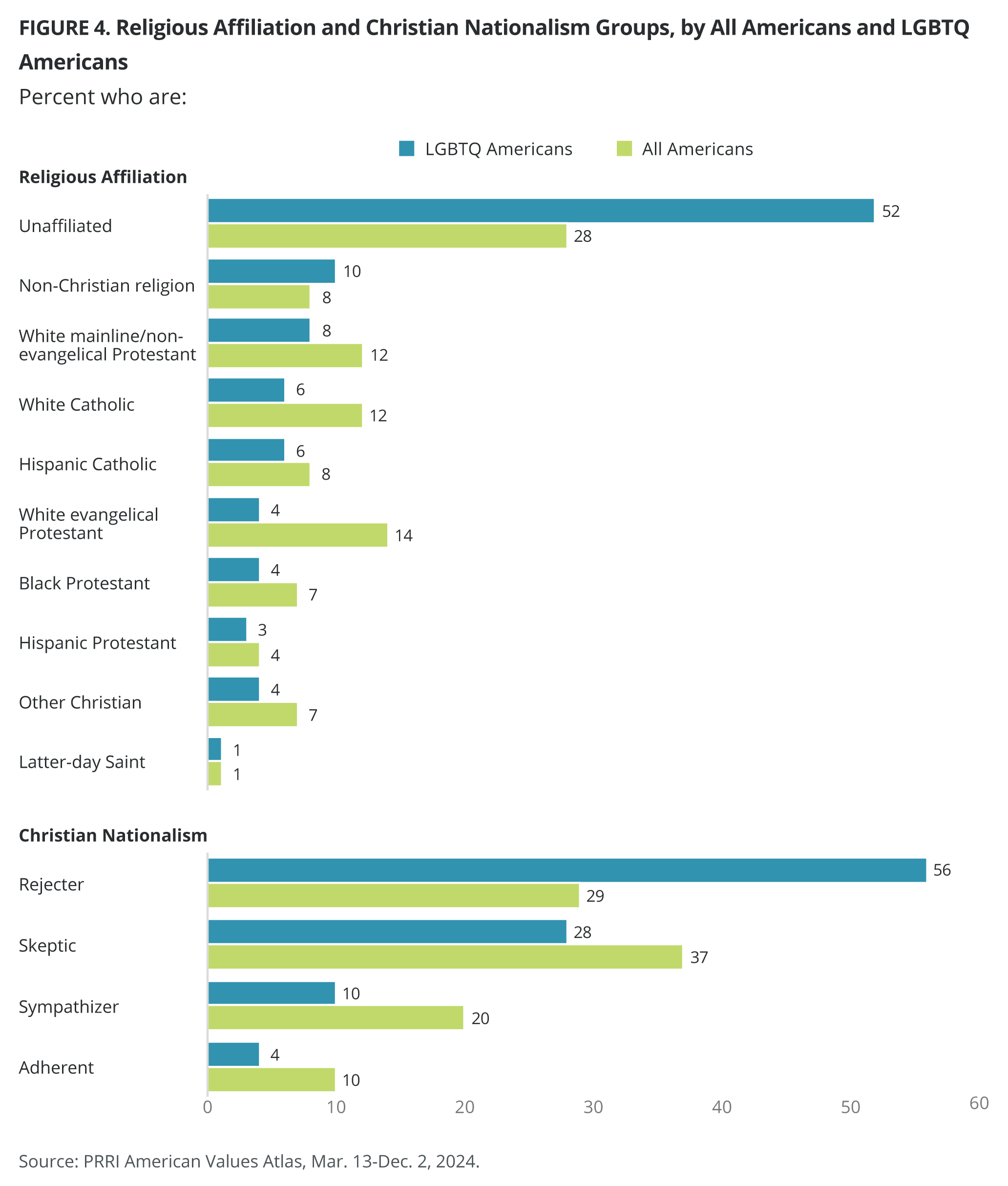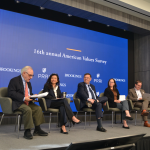Following the release of “LGBTQ Rights Across All 50 States: Key Insights from PRRI’s 2024 American Values Atlas,” PRRI hosted an online event to examine the survey’s findings related to Americans’ views on LGBTQ rights across all 50 states.
Former PRRI Public Fellow, Kelsey Burke, Ph.D., joined PRRI CEO Melissa Deckman, Ph.D., in a discussion about the relationship between LGBTQ individuals and religious affiliation, public opinion on LGBTQ nondiscrimination protections, religiously based service refusals, and same-sex marriage, as well as support for the rights of transgender people.
Notably, while LGBTQ individuals are more likely to be religiously unaffiliated compared with all Americans (52% vs. 28%), more than four in ten LGBTQ Americans identify as religiously affiliated (46%).
Burke, who is a professor of sociology at the University of Nebraska-Lincoln, commented that the percentage of religiously affiliated LGBTQ individuals “is especially notable given how often religion can be unwelcoming or hostile to queer folks.”
According to 2024 PRRI American Values Atlas data, 67% of Americans support same-sex marriage and 75% of Americans support LGBTQ nondiscrimination laws, but only 37% of Americans oppose laws that require driver’s licenses or government IDs to display a person’s sex at birth rather than their gender identity.
From this, Burke noted how difficult it is to generalize people’s attitudes towards LGBTQ people, because of the differences in support for transgender rights compared with other issues, such as marriage equality or employment discrimination.
However, Burke contrasts this by noting the recency of public opinion polling on Americans’ views of transgender people
“Some of the data can make it seem like a stark contrast when it comes to Americans’ attitudes about trans people when comparing attitudes to LGB [lesbian, gay, and bisexual] people. But we don’t know about long-term trends when it comes to attitudes specific to trans people because public opinion polling wasn’t asking these questions, 15, 20, 30 years ago.”
Additionally, amid the Trump administration’s enactment of executive orders restricting the rights of LGBTQ people, Deckman made sense of these actions as they relate to Americans’ views on LGBTQ rights.
“I think there’s political momentum on the Right to try to have a reversal of some of these [LGBTQ protection] policies, but what strikes me is that we don’t find broad support for those measures at all in our data. We’re not necessarily seeing a wholesale shift when it comes to Americans’ attitudes.”
Instead, Deckman notes the high levels of stasis in Americans’ support for same-sex marriage and nondiscrimination policies over the years. In 2015, 65% and 71% of all Americans supported same-sex marriage and nondiscrimination laws for LGBTQ people, respectively, compared with 67% and 75% in 2024.
Finally, the conversation wrapped up with a discussion of Gen Zer’s attitudes towards LGBTQ rights and the myth of the conservative trend of young people.
Burke noted the rise of political forces that flood young people with anti-LGBTQ sentiment.
“The conservative movement and specifically far-right organizations have targeted young people with anti-LGBTQ messaging. Turning Point USA is one big example of this… Social media too is a place that young people are heavily involved and where we see some of the strongest opposition and also misinformation to queer people.”
However, Deckman noted that data on young Americans’ attitudes towards LGBTQ rights remain favorable. Majorities of Gen Zers still support nondiscrimination policies (72%), oppose religiously based service refusals (60%), and support same-sex marriage (68%).
“I think there are headwinds when it comes to fighting on college campuses because you have a very well-resourced group of conservative organizations, who have spent a lot of time trying to change people’s opinions. But I don’t think there’s anything in the data suggesting that even near a majority of younger Americans are supporting those policies.” Deckman added.
View the full event recording here and check out LGBTQ Rights Across All 50 States: Key Insights from PRRI’s 2024 American Values Atlas.
Slides presented during the webinar are available here.








